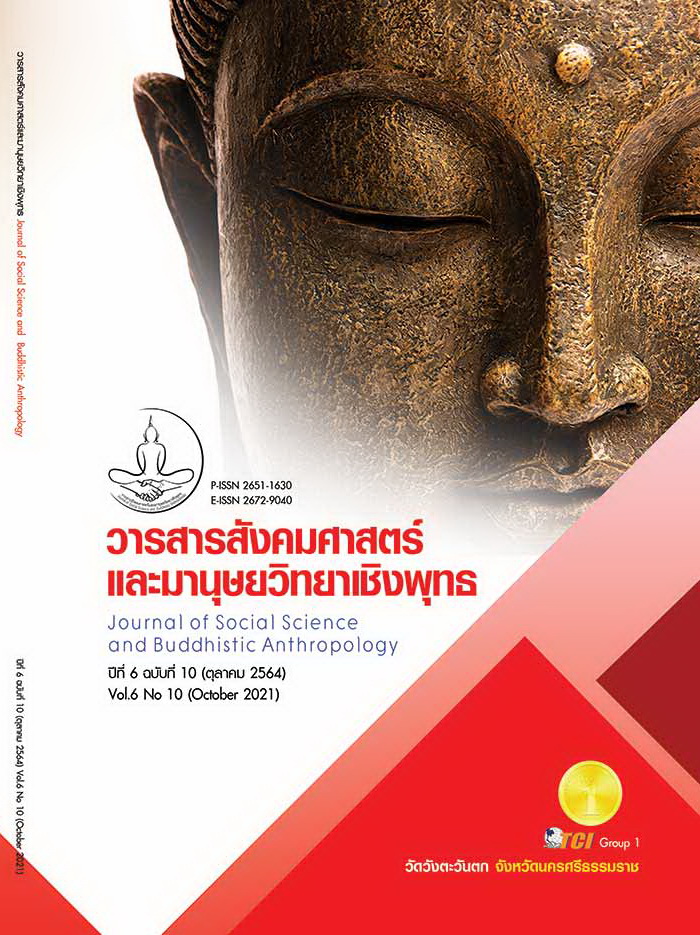A MODEL OF PROMOTION LIFELONG LEARNING IN DIGITAL ERA FOR NON-FORMAL AND INFORMAL EDUCATION CENTRE IN THE FUTURES
Keywords:
Promotion Learning, Lifelong Learning, Non-Formal and Informal Education CentreAbstract
The objectives of this article were to Develop a model of promotion lifelong learning in digital era for non-formal and informal education centre in the futures. Is divided into 3 phases. The 1st phases, study theories and concepts to define elements. The 2nd phase to developa model of promotion lifelong learning in digital era for non-formal and informal education centre in the futures by Ethnographic Delphi Futures Research (EDFR) with 17 specially qualified persons who were academicians 5 persons, executives 9 persons, and partnerships 3 persons. And the 3nd phase, a research validate the suitability and feasibility of the model with sampling are administrators 274 persons by online questionnaire. The statistics utilized in the data analysis ware frequency, mean, percentage, interquatile range and standard deviation. The research findings were as follow: 1) Elements of promotion lifelong learning found that Creating vision and set the atmosphere, link with learning resources by various collaboration, learning with information technology and requesting cooperation. 2) A model of promotion lifelong learning in digital Era for non-formal and informal education centre in the futures. A study found that there ware 8 fields in this model. 2.1) Creating a learning vision 2.2) Self-Learning organizing and culture, 2.3) Links with learning resources, 2.4) Collaboration, 2.5) Learning processes in many method, 2.6) Promoting the use of information and learning technologies 2.7) Development of learning activities 2.8) Requesting cooperation for Learning. 3) A model of promotion lifelong learning in digital era for non-formal and informal education centre in the futures, Showed suitability as the high level ( = 4.43) and feasibility as the high level (
= 4.20)
References
เกรียงศักดิ์ เจริญวงศ์ศักดิ์. (2543). ปั้นสมองของชาติ. กรุงเทพมหานคร: ซัคเซสมีเดีย.
จักรวุฒิ ชนะพันธ์. (2559). รูปแบบการส่งเสริมการเรียนรู้ตลอดชีวิตของสำนักงานส่งเสริมการศึกษานอกระบบและการศึกษาตามอัธยาศัยจังหวัดชัยภูมิ. ใน ดุษฎีนิพนธ์ปรัชญาดุษฎีบัณฑิต สาขาวิชาการบริหารการศึกษา. มหาวิทยาลัยราชภัฏบ้านสมเด็จเจ้าพระยา.
นิตยา สําเร็จผล. (2547). การพัฒนาตัวบ่งชี้การจัดการศึกษาเพื่อการเรียนรู้ตลอดชีวิต. ใน ดุษฎีนิพนธ์การศึกษาดุษฎีบัณฑิต สาขาวิชาวิจัยและพัฒนาหลักสูตร. มหาวิทยาลัย ศรีนครินทรวิโรฒ.
รุ่งรัชดาพร เวหะชาติ. (2548). การพัฒนารูปแบบการบริหารคุณภาพทั้งองค์การของสถานศึกษาขั้นพื้นฐาน. วารสารมหาวิทยาลัยทักษิณ, 8(2), 79-83.
ลัดดาวัลย์ เพชรโรจน์ และอัจฉรา ชำนิประศาสน์. (2547). ระเบียบวิธีการวิจัย. กรุงเทพมหานคร: พิมพ์ดีการพิมพ์.
วณิชชากร พงศ์ทัศนาและคณะ. (2560). รูปแบบการบริหารจัดการเชิงกลยุทธ์สำหรับสำนักงานส่งเสริมการศึกษานอกระบบและการศึกษาตามอัธยาศัยจังหวัดในอนาคต. ใน ดุษฎีนิพนธ์ปรัชญาดุษฎีบัณฑิต สาขาวิชาการบริหารการศึกษา. มหาวิทยาลัยราชภัฏนครศรีธรรมราช.
วิจารณ์ พานิช. (2555). วิถีสร้างการเรียนรู้เพื่อศิษย์ในศตวรรษที่ 21. กรุงเทพมหานคร: มูลนิธิสดศรี-สฤษดิ์วงศ์.
สำนักงานคณะกรรมการพัฒนาเศรษฐกิจและสังคมแห่งชาติ. (2559). แผนพัฒนาเศรษฐกิจและสังคมแห่งชาติ ฉบับที่ 12 (พ.ศ.2560-2564). กรุงเทพมหานคร: สำนักงานคณะกรรมการพัฒนาเศรษฐกิจและสังคมแห่งชาติ สำนักนายกรัฐมนตรี.
สำนักงานส่งเสริมการศึกษานอกระบบและการศึกษาตามอัธยาศัย. (2563). แนวทางการขับเคลื่อนการดำเนินงานสำนักงาน กศน. ประจำปีงบประมาณ พ.ศ. 2563. กรุงเทพมหานคร: กลุ่มแผนงาน สำนักงาน กศน.
สุมัทนา หาญสุริย์. (2563). การศึกษาบนโลกดิจิทัล. วารสารการบริหารการศึกษาและภาวะผู้นำ มหาวิทยาลัยราชภัฏสกลนคร, 8(31), 9-21.
สุมาลี สังข์ศรี. (2544). รายงานการวิจัยการศึกษาตลอดชีวิตเพื่อสังคมไทยในศตวรรษที่ 21. กรุงเทพมหานคร: สถาบันเทคโนโลยีเพื่อการศึกษาแห่งชาติ.
Candy, P. et al. (1994). Developing Lifelong Leaners Through Under Greduate Education. Australian Government Publishing Service. Educational and sychological Measurement, 30(3), 607-610.
Knapper, C. K. & Cropley, A. J. (2000). Lifelong Learning in Hingher Education. Great Britain: Kogan Page.
Knowles, M. S. . (1972). Toward a Model of Lifelong Education. Boston: Boston University.
Krejcie, R. V. & Morgan, D. W. (1970). Determining Sample Size for Research Activities. Educational and Psychological Measurement, 30(3), 607-610.
Macmillan, T. T. (1971). The Delphi Technique. In Paper Presented at the Annual Meeting of the California Junior Colleges Associations Committee on Research and Development (pp. 3-5). Monterey: California.
Murphy, R. et al. (2001). What Do We Know About Developing Lifelong Learners? Nottingham: CDELL.
National Board of Employment, Education and Training. (1996). Lifelong Learning-Key Issuees. Canberra: Australian Government Publishing Service.
Smith, J. & Spurling, A. (1999). Lifelong Learning Riding the Tiger. London: Cassell.









